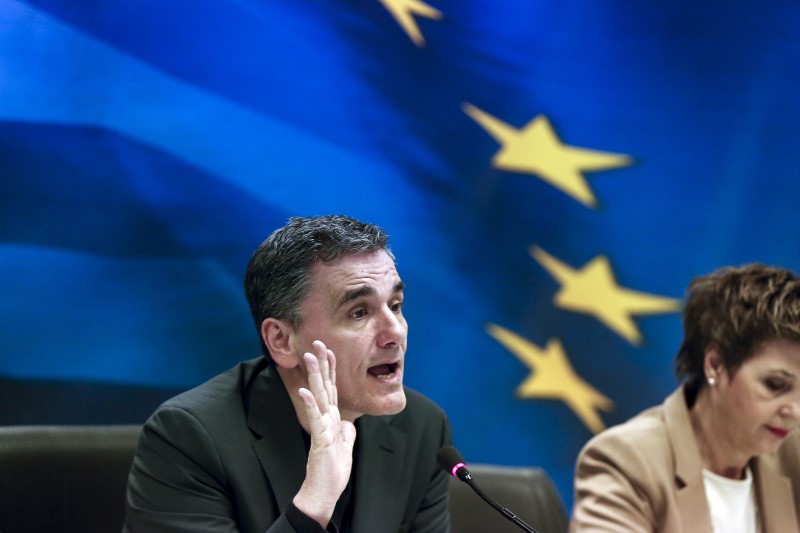By Francesco Guarascio and Renee Maltezou
BRUSSELS (Reuters) - Euro zone finance ministers will begin discussing debt relief for Greece after once international lenders verify that Athens has carried out promised reforms, Jeroen Dijsselbloem, the chairman of the ministers, said on Monday.
The debt talks will focus on extending the maturities of loans from the euro zone, their grace periods and on some interest rate reductions to cap annual debt servicing costs at a manageable level. There will be no write-off of capital.
But to start the talks, euro zone ministers first want to see that Greece has implemented reforms of the pension system and the income tax, set up an independent revenue agency and adopted a strategy to deal with non-performing loans.
A mission comprising senior officials from the euro zone bailout fund, the International Monetary Fund, the European Commission and the European Central Bank started assessing Greece's progress in January, but cut the process short in early February.
That was because of differences between Greece and the lenders over the depth of the pension reform and the strategy on bad loans, but also because the IMF and the euro zone disagreed on how to make the Greek economy sustainable in the longer term.
While views were not completely aligned yet, Dijsselbloem said, they had converged enough to resume the review.
"The mission chiefs will return to Athens, perhaps already tomorrow," Dijsselbloem said. "There is enough common ground, enough preparation has been done for their mission to continue, hopefully to work towards a successful completion."
But he noted Greece would need to do more to earn a positive reform review from the lenders.
"If we are to fully comply with what was agreed last summer, more work will need to be done," he said referring to agreements between Greece and the lenders from July and August 2015.
"The package of measures needs to become even more solid, needs to go even deeper than what has been put on the table so far," noting Greece's fiscal outlook still had gaps.
The IMF has been insisting that to make the Greek economy stand on its own after 2018, when the euro zone bailout ends, either Greek reforms have to be much more radical, or the euro zone has to offer Athens more substantial debt relief.
The ministers acknowledged that on Monday, Dijsselbloem said, and a debate about the right mix of debt relief and Greek reforms was coming up quickly.
"We are aware that part of the overall solution will have to be some debt relief measures," he said. "We will do whatever is necessary to make the annual debt service manageable ... that discussion is going to be on our table in the near future."
Key to the Greek programme signed last August is a target of a primary surplus of 3.5 percent of gross domestic product in 2018, which the country is to maintain for years afterwards.
"The key issue is that there has to be clarity on a package which does hit the targets as agreed this summer," Dijsselbloem said, adding existing Greek pension and tax reform plans would "have to be supplemented to reach that ambition".

"Even that may not be enough and that is why we will have to talk about the debt issue to make sure that the outcome for Greece is also sustainable in the long term," he said.